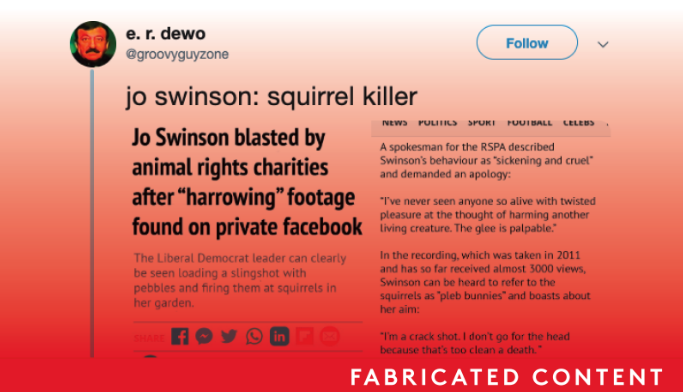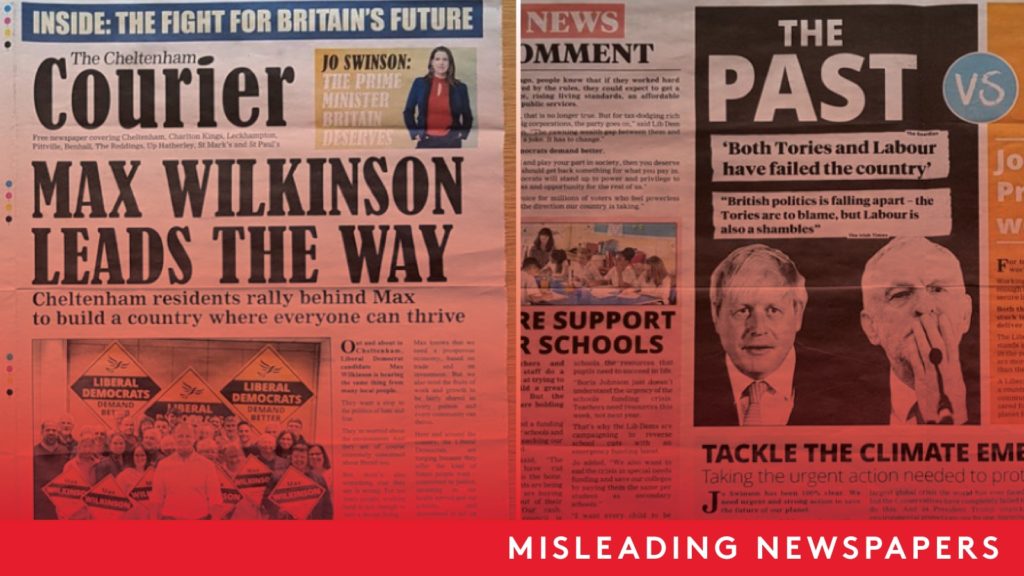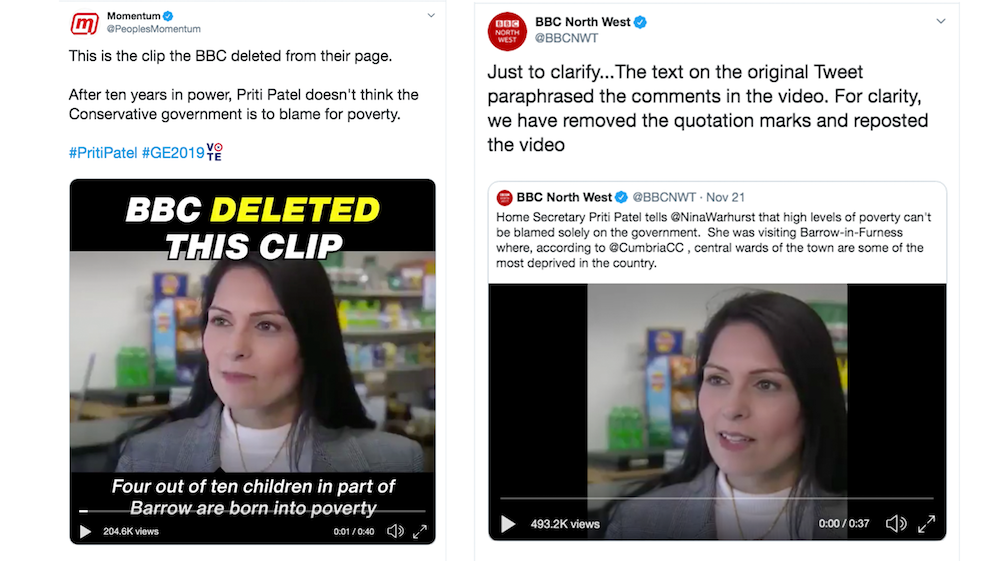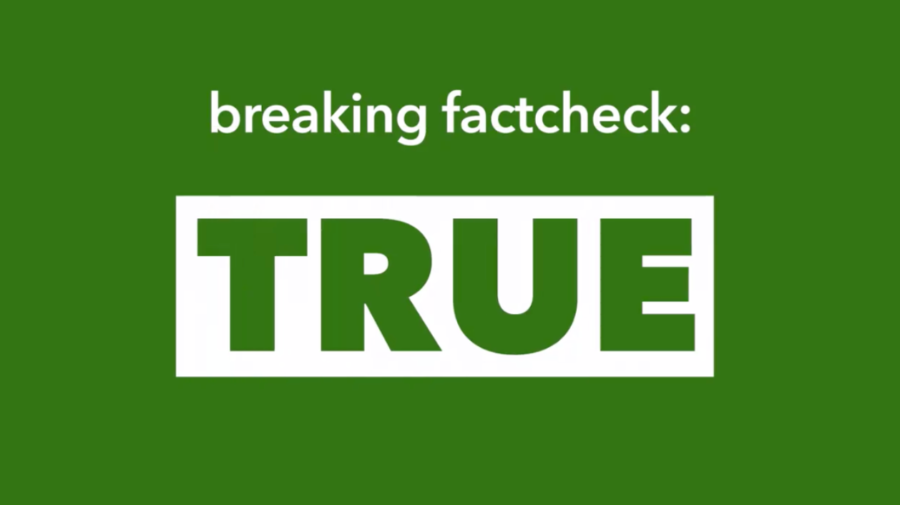To the surprise of no one, the third week of the UK election campaign unleashed yet more disinformation and media manipulation, with political parties stepping up to grab the headlines.
Over the last seven days, the collaborative CrossCheck project’s investigations included a fake Labour manifesto site, the continued circulation of a hoax targeting the Liberal Democrat leader, and a misleadingly edited video of the shadow equalities minister.
A Conservative ‘fact-checking’ service, a fresh doctored video and a parody Labour manifesto site
Having already posted a “satirical” doctored video of shadow Brexit secretary Sir Keir Starmer, the Conservative Party was criticised for multiple attempts to mislead voters this week.
As the campaign stepped up a gear with the first televised debate on November 19, the Conservative Party press office created huge waves by changing the branding of its Twitter account, @CCHQPress, to appear as a fact-checking service.
For the duration of the head-to-head between Prime Minister Boris Johnson and Labour leader Jeremy Corbyn, “factcheckUK” posted a variety of graphics and GIFs criticising Corbyn and praising Johnson.
Immediately following the debate, First Draft highlighted some of the other nations, including Mexico and Turkey, in which governments had launched their own fact-checking services to push a party line.
Senior Conservatives defended their actions, claiming it was clear the account was from CCHQ. However, Twitter took a rare stance in accusing the Tories of misleading the public with the stunt, adding that it would take “decisive, corrective” action if it repeated the act.
Then, on the day of the Labour manifesto launch on November 21, the CCHQ Twitter account posted a five-second clip of Labour MP Jess Phillips appearing to say that her party wouldn’t be able to deliver its election pledges. While the CCHQ version of the video was stamped with that day’s date, it was in fact from an interview on October 3. The MP condemned the clip as “misleading”.
During the week the Conservative Party had launched a website mocking Labour’s manifesto, complete with a homepage in the party’s signature shade of red. An ad for the site, paid for by the Conservative Party, even appeared to be the top result under “labour” for some Google users. The site came to people’s attention also on November 21.
Following the “factcheckUK” episode, James Temperton, WIRED’s digital editor, wrote: “Counterintuitively, the stunt has allowed a number of Tory MPs to go on TV and radio and push the line that Jeremy Corbyn can’t be trusted.
“Most of the electorate don’t use or care about what happens on Twitter. What last night’s stunt has allowed the Conservative Party to do is get everyone talking about facts and the truth rather than policy.”
Jo Swinson forced to deny fake squirrel claims

First Draft had been tracking a rumour concerning Jo Swinson and squirrels since it first appeared on Twitter. Image by First Draft
The Lib Dem leader was asked about a viral hoax concerning squirrels on LBC radio on November 19.
First Draft had been monitoring the hoax since it first appeared on Twitter in early November 2, when it first appeared on Twitter. An account shared a doctored Daily Mirror article, which was retweeted nearly 1,000 times by pro-Labour accounts. It was reshared hundreds of times more with many people appearing to believe the claim was true.
First Draft decided not to report on this until it had reached a tipping point (in this case, the LBC interview). Often, those producing fake stories aim to get them in the mainstream media – even if it’s in the form of a debunk.
A Medium post later emerged from a fictitious publication and a non-existent author pushing the same false claims (First Draft has chosen not to link to this site or pieces of disinformation). The author used a stock image of “woman thinking” as a profile picture. Later, the hoax was given a new lease of life after the Medium post was picked by a Brexit Party account and was shared over 4,000 times on Facebook, according to CrowdTangle data.
Campaign literature masquerading as newspapers

‘Fake’ newspapers have been posted through voters’ letterboxes in the run-up to the UK general election on December 12. Image by First Draft
Also on November 21, First Draft was alerted by CrossCheck partners to election literature from political parties masquerading as newspapers. Voters described the move as “underhand” and “unethical”.
The ‘fake’ newspapers — including ‘St. Albans and District News’, ‘Hazel Grove Gazette’ and ‘Cheadle Challenger’ — have been reported in at least 13 constituencies in recent days. The Liberal Democrats appear to be promoting the literature in at least 12 of these areas. A Lib Dem spokesman said: “We stand by keeping local people informed of local issues.”
There was one example of a Labour newspaper in the constituency of Tooting, and one of a Conservative paper in Cheltenham.
Using search strings on Twitter targeting the political parties and their newspapers, First Draft found that several users have called out the newspapers as disinformation campaigns by the parties attempting to disguise their campaign material as legitimate newspapers. First Draft has reached out to Labour and the Conservatives for comment.
Reposted BBC North West clip

Momentum and BBC tweets about a video clip of Home Secretary Priti Patel, which was re-uploaded by the BBC with a clarification concerning quotation marks. Screenshot by author
Also on November 21 – what might be considered a busy day for disinformation watchers – Labour grassroots organisation Momentum tweeted an interview clip of home secretary, Priti Patel, captioned: “This is the clip the BBC deleted from their page. After ten years in power, Priti Patel doesn’t think the Conservative government is to blame for poverty.” At time of writing, it has been shared over 4,000 times.
BBC North West had deleted the tweet, but reposted it shortly after, explaining that “the text on the original tweet paraphrased the comments in the video. For clarity, we have removed the quotation marks and reposted the video”.
Momentum made no reference to the clarification, and the organisation’s post – with the text “BBC deleted this clip” – continues to be shared. The organisation has not responded to requests for comment.
Misleadingly edited video of Dawn Butler
On November 20, we came across a tweet showing a misleadingly edited interview with shadow equalities minister Dawn Butler.
Echoing the Conservatives’ doctored video of Brexit secretary Keir Starmer, the clip had been cut to remove Butler’s full answer. The editing appeared to make it seem like she answered “well, I don’t know” to a question about whether Jeremy Corbyn or the secretary of the Jewish Labour movement, Peter Mason, was telling the truth about the issue of outstanding antisemitism cases. The tweet now has over 1,000 retweets.
In fact, the interview with Sky News the previous morning actually shows Butler replying, at around the 0:30 second mark, with: “Well, I don’t know where anyone will be getting that information from because that is confidential information”. This was before she went on to talk about wider Labour processes for dealing with racism.
The existence of outstanding antisemitism cases is under dispute. Corbyn said all cases have been investigated, but Mason claims there are currently at least 130 unresolved cases before Labour’s National Constitution Committee, with details of thousands more submitted to the Equality and Human Rights Commission.
Check out First Draft’s round-up of disinformation and media manipulation from last week.
Ali Abbas Ahmadi, Bethan John and Alastair Reid also contributed to this report.
Interested in becoming a CrossCheck partner? Get in touch.
Stay up to date with First Draft’s work by becoming a subscriber and follow us on Facebook and Twitter.






